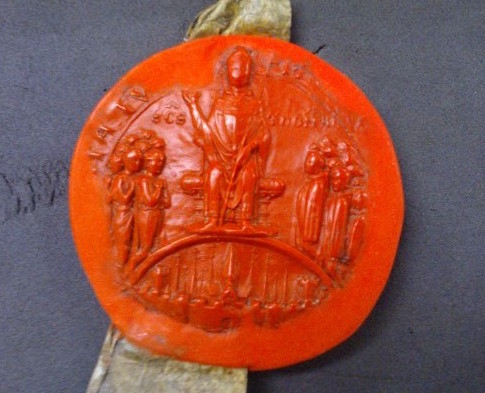
Who was Thomas Becket?
In my last blog we saw how, on 19 January 1170, an exasperated Pope Alexander III had given King Henry II of England forty days to end the quarrel with Thomas Becket, his archbishop of Canterbury. The threat to Henry was real enough: failure to comply would lead to an interdict being imposed across Henry’s extensive continental lands. A month beforehand, Becket had threatened to lay an interdict on England. An interdict could be described as a strike by the clergy. In theory, it meant that the laity were denied the sacraments of the Church. Interdicts were occasionally imposed by popes throughout the Middle Ages. The most famous interdict in English history was the six-year one imposed by Pope Innocent III, in March 1208, as a result of his dispute with King John, Henry’s son. Another interdict, imposed on France in 1200, was described by the English chronicler, Abbot Ralph of Coggeshall, in distressing terms:
‘Oh what a horrid and miserable spectacle it was to see in every city the sealed doors of the churches. Christians shut out from entry as though they were dogs, the cessation of divine office, the withholding of the sacrament of the body and blood of our Lord, the people no longer flocking to the famous celebration of saints’ days, the bodies of the dead not given burial according to Christian rites, the stink infecting the air and the horrible sight filling with horror the minds of the living.’
Of course, an abbot such as Ralph was likely to portray an interdict in apocalyptic terms. As far as he was concerned, what, after all, could be worse than the denial of the sacraments of the Church? Nevertheless, this was a serious threat to Henry’s rule and it was one designed to force the king to come to terms with his archbishop.
Today marks the forgotten 850th anniversary of Alexander’s original deadline. In fact, by late February 1170 the deadline had already been extended and, in the end, it passed almost completely unnoticed. As an attempt to bring the two parties together, it failed. It was not the first such failure. Almost exactly one year previously, a papal deadline of 5 March 1169 had similarly failed to lead to a reconciliation between Becket and Henry. At the end of my last blog I asked how Becket and Henry would respond to the pope’s efforts. The answer is clearly in much the same way as they had over the course of the preceding six years when many other attempts at compromise had come to naught. Why was it proving so difficult to reconcile archbishop and king?
There can be no doubt that there were serious issues at stake. In my last blog we saw how the question of criminous clerks and their punishment had divided the two men. It was, however, far from the only subject of dispute. In January 1164 Henry had published his Constitutions of Clarendon. In his opinion, these merely codified what had long been existing custom in England. Alongside provision for the punishment of criminous clerks, the Constitutions set out that no one who held land directly of the king could be excommunicated without royal permission. They declared that elections of bishops and abbots were to be held in the royal chapel where, of course, the king could keep a close eye on proceedings. When an election was held for the vacant bishopric of Winchester in 1173, Henry supposedly wrote to the electors: ‘I order you to hold a free election, but forbid you to elect anyone save Richard my clerk.’ That was Henry’s style. During periods of vacancy such as these, the Constitutions ordained that revenues from church lands should flow to the Crown – an incentive for the king to delay filling ecclesiastical offices of course. The Constitutions also clamped down on the ability of prelates to appeal to Rome above the king’s head. The Constitutions may have been a reiteration of custom, but the problem for Henry was that things had changed. For decades in late eleventh- and early twelfth-century Europe, Emperor and Pope had clashed in the Investiture Controversy which had the same essential question of royal versus ecclesiastical power at its heart. The Church had developed a formidable intellectual position in the schools of Paris and Bologna in defence of its rights and was far better placed to challenge the power of secular rulers such as Henry. In the 1160s this Controversy had flickered back into life as the emperor, Frederick Barbarossa, quarrelled with Pope Alexander. This was of use to Henry. Faced with the emperor’s support for rival anti-popes, Alexander had to keep Henry in his camp, a factor which prevented him from wholeheartedly supporting Becket during these years. All the same, it is clear that Becket had the weight of significant scholarship and authority on his side.
However, the learning of the theologians and lawyers intimidated Becket himself. And here we see that the conflicting personalities of Henry and Becket were as responsible for driving the dispute between the two men as were the thorny issues of practice and policy. Becket had been born, probably in 1120, to Gilbert and Matilda. Gilbert and Matilda were both Normans who had settled in London where Gilbert enjoyed a successful career as a merchant, even holding political office as sheriff. Until the Reformation Thomas would be seen very much as London’s saint by a proud citizenry, hence his appearance on the seal of the city in the image above. Thomas had a good education, mostly at Merton Priory, then outside the city of London, and perhaps in the school at St Paul’s Cathedral, obviously very much within the city. He also spent a year in Paris. By the time he was twenty-one or so, then, he had completed the foundational liberal arts degree. What Becket had not done, however, was spend years studying theology in Paris or law in Bologna. Becket’s education and Latin were good, but they were knocked into a cocked hat by the education and Latin of the clerks who had spent years in these schools. These men, known as ‘masters’, knew not just the law codes and the Bible inside out, but also the concordances and glosses, drawn up by men such as Gratian and Peter Lombard, which discussed and illuminated the true import of these texts. As Becket rose in royal and ecclesiastical service, he was increasingly surrounded by men of this stamp. To be sure, many of these scholars came from similar backgrounds to Becket: they were relatively humble men. But even though Becket would later spend a year studying law in Bologna and Auxerre, Becket was no intellectual match for men such as these and he knew it. He was thus insecure and somewhat chippy. One contemporary even likened Becket to a prickly hedgehog. All of which made Becket determined to prove to his contemporaries that he was their match in other ways. This was certainly one factor which prevented Becket from compromising with the king between 1164 and 1170. He always felt he had something to prove.
That is not to say that Becket did not possess many admirable qualities. He was quite a worldly youth, which is perhaps one reason why he never progressed beyond the basic arts degree. However, in the households of aristocrats, wealthy London bankers and Theobald (c.1090-1161), archbishop of Canterbury, Thomas learnt the fashionable manners of the court. He was charming, witty, bright and a good conversationalist. While it might be something of a cliché, it seems that Thomas was indeed tall and handsome. In Frank Barlow’s words, ‘such endowments make a little[!] education go a very long way.’ Powerful men took a shine to him. Theobald gave Becket a place in his household and obtained for him the archdeaconry of York in addition to several other benefices and prebendaries; Henry made him his chancellor. For a man ‘raised from the dust’ like Thomas, this was quite a rise and he revelled in the glamour and luxury of court life. He was a diligent and loyal servant. When Theobald died, then, Henry chose Thomas to replace him as archbishop of Canterbury. As far as Henry was concerned, Becket was his man and he wanted someone capable and knowledgeable in the role. The problem was that Becket was clearly unsuitable for the office. He was, first and foremost, a royal courtier and not an ecclesiastic. He was no theologian and there were many who were better educated than he was. In fact, he had not even been ordained priest. Even Thomas doubted his suitability for office. However, Henry II was a man used to getting his own way: on 2 June Thomas was ordained priest and, on the following day, he was consecrated archbishop.
Becket’s consecration must have pleased Henry a great deal. With a loyal and subservient archbishop in place, the king would no doubt have looked forward to his archbishop supporting his plans for reform and protecting his dynastic interests. As we have seen, however, just over two years later Becket fled the realm into a six-year-long term of exile after a bitter clash with his king. In my next blog, we shall examine the personality of Henry II and the ways in which his character contributed to the protracted dispute between the two men.








Ian Stone, historian | Who was Henry II?
5th April 2020 at 1:18 pm[…] Who was Thomas Becket? […]
Ian Stone, historian | Return of the Archbishop: Thomas Becket lands in England
30th November 2020 at 8:17 am[…] 30 November 1170, that is 850 years ago today, Thomas Becket set sail for England from Wissant in the county of Boulogne. On 1 December he landed at Sandwich […]